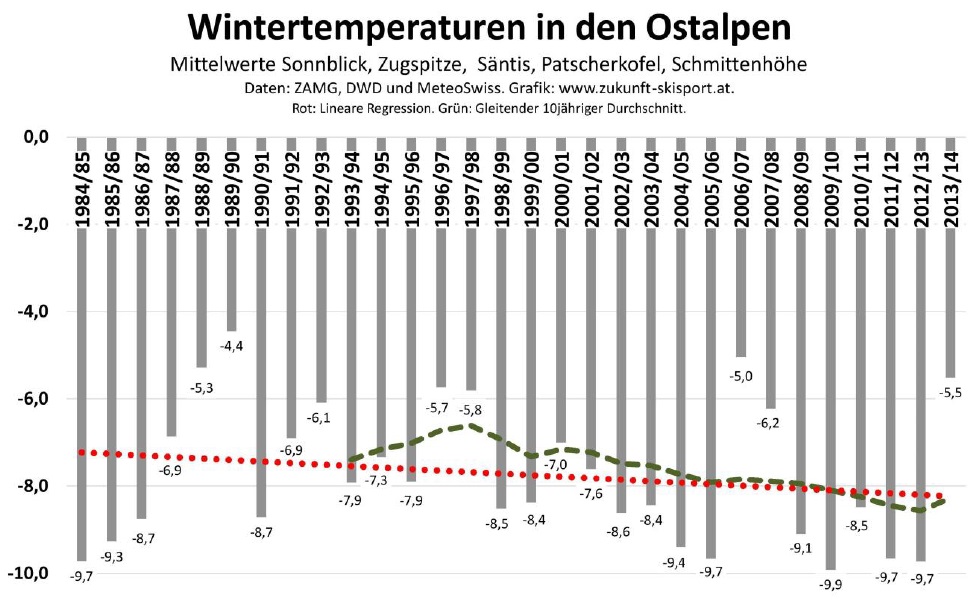First of all, I will just spread some ideas. I never did a winter bivi by myself. Please don't blindly trust my words.
But... because I am interested in the idea and like to do something similar in future, I searched for some info which might help you (and me). Still I am looking forward for better answers (which are based on experience and real knowledge!).
There is such a thing as too warm. Weight. Size. Depending on your activity outdoors you shouldn't "simply" get the warmest sleeping bag. You might get really slow while climbing due to the heavy load and we all know the premiss: speed means safety.
It's not in extreme heights and winter isn't necessarily that cold in the Alps. Of course it's not the Himalayas, but we also shouldn't downplay the risks. I tried to get some information about temperatures. There has to be better and more detailed data, but this is a starter:
- Temperatures for the Eastern Alps over the last years as an average over several summits in the asked height level
http://www.querschuesse.de/wp-content/uploads/2014/10/A423.jpg

From the above links we can guess how cold it will be at night. But we can't say for sure. Tough to find some night temperatures (with statistics) but at least here is a
So you can observe the actual temperatures at night for some cold places in Switzerland.
More food to think about:
- Which part of the Alps are you going to? South Alps are generally warmer due to Mediterranean influence, even at winter.
- Will there be Foehn? Atmospheric inversion?
- Check the weather even more detailed as you would in summer!
- How do you generally feel in terms of coldness? Are you feeling cold easily?
- The sleeping bag is just a part of the equipment. As important is the kind of bivi sack and mattress you are using.
- You are going to sleep in underwear or fully dressed (related)?
- How long do you plan to be outdoors? One night or five? Wet conditions on a multiday trip without having the possibility to get dry clothing is a major problem. Down suffers from this even more as synthetic fibre and even the second night could be really bad if you have to go in your damp-wet sleeping bag...
- Will you use a vapour barrier liner for the sleeping bag (and maybe also socks)?
Also if you are going to dig a snow cave, please learn how to do it properly! Otherwise choking instead of the cold might be the biggest danger. If you have the conditions (you won't necessarily have enough snow to get a good cave) you could get a pretty warm place to sleep - around freezing point. Please read along: Using a tarp over the entrance of a snow cave, Best approach to camping in snow, How to set up a tent in deep snow
For bivi packs see e.g. Differences for bivi packs, for the bivi see Planned winter bivi.
I also found a topic in German where they discussed a similar question. He asks for nights down to -35°C which might occur but this is somehow extreme for the typical night in the Alps. I think -20°C is more likely. With your additional gear and clothing you most likely don't need a sleeping bag with comfort temperature of -20°C...
The guy in the link above ends up with following setup:
Therm-a-Rest Haven, 3/4- 14mm- Eva- mattress, Exped VBL-Liner
This is a bag with T_comfort=-1°C, T_limit=-6°C, T_extreme=-23°C which I personally wouldn't suggest. But he tested it with all his personal requirements and gear in around -20°C and was very happy with it.
This is a very good and complex question. I think there is no distinct answer like "you need a T_limit=-25°C bag for the Alps". There is so much to think of for preparing the trip and I would suggest to not just jump into a winter bivi in 2800m from zero experience, get there with incrementalism.
Again, I just tried to gather informations, this isn't a proper answer. I hope we get more useful replies soon!
